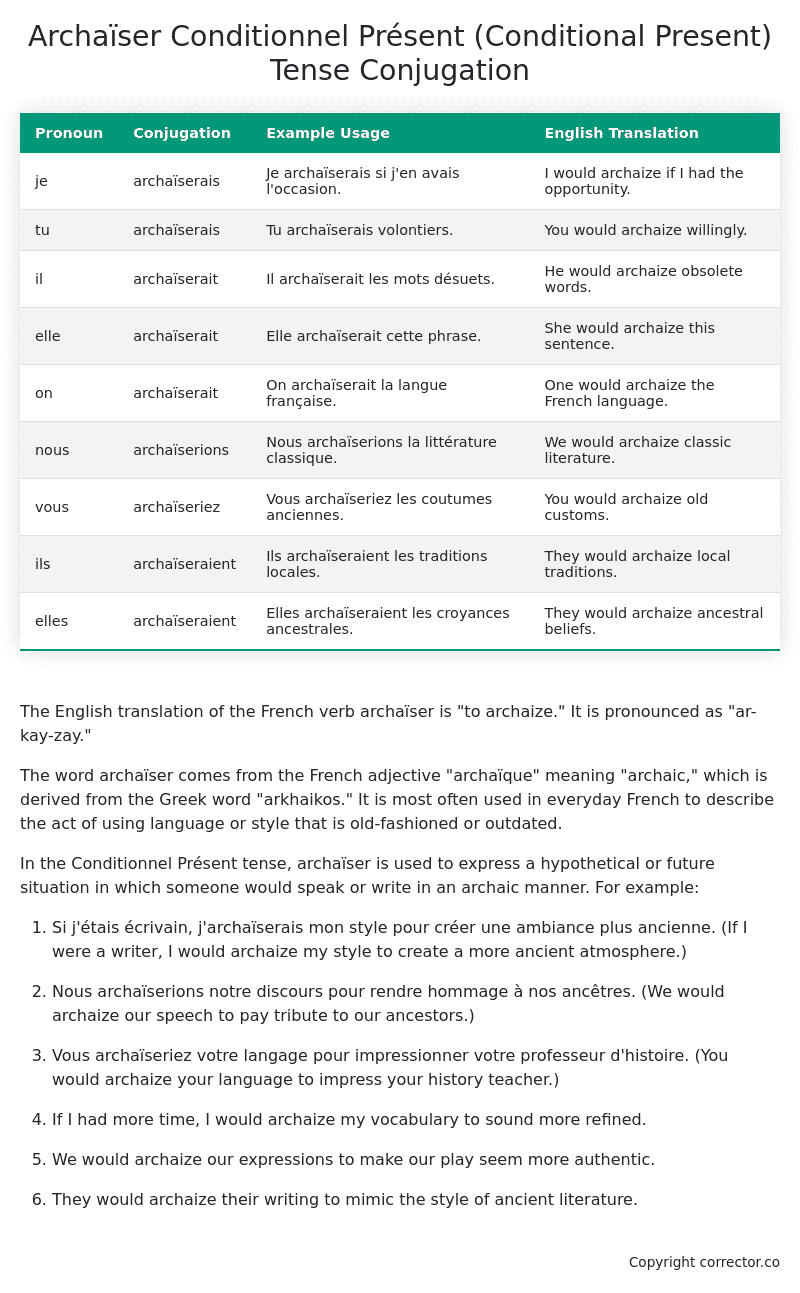Conditionnel Présent (Conditional Present) Tense Conjugation of the French Verb archaïser
Introduction to the verb archaïser
The English translation of the French verb archaïser is “to archaize.” It is pronounced as “ar-kay-zay.”
The word archaïser comes from the French adjective “archaïque” meaning “archaic,” which is derived from the Greek word “arkhaikos.” It is most often used in everyday French to describe the act of using language or style that is old-fashioned or outdated.
In the Conditionnel Présent tense, archaïser is used to express a hypothetical or future situation in which someone would speak or write in an archaic manner. For example:
-
Si j’étais écrivain, j’archaïserais mon style pour créer une ambiance plus ancienne. (If I were a writer, I would archaize my style to create a more ancient atmosphere.)
-
Nous archaïserions notre discours pour rendre hommage à nos ancêtres. (We would archaize our speech to pay tribute to our ancestors.)
-
Vous archaïseriez votre langage pour impressionner votre professeur d’histoire. (You would archaize your language to impress your history teacher.)
-
If I had more time, I would archaize my vocabulary to sound more refined.
-
We would archaize our expressions to make our play seem more authentic.
-
They would archaize their writing to mimic the style of ancient literature.
Table of the Conditionnel Présent (Conditional Present) Tense Conjugation of archaïser
| Pronoun | Conjugation | Example Usage | English Translation |
|---|---|---|---|
| je | archaïserais | Je archaïserais si j’en avais l’occasion. | I would archaize if I had the opportunity. |
| tu | archaïserais | Tu archaïserais volontiers. | You would archaize willingly. |
| il | archaïserait | Il archaïserait les mots désuets. | He would archaize obsolete words. |
| elle | archaïserait | Elle archaïserait cette phrase. | She would archaize this sentence. |
| on | archaïserait | On archaïserait la langue française. | One would archaize the French language. |
| nous | archaïserions | Nous archaïserions la littérature classique. | We would archaize classic literature. |
| vous | archaïseriez | Vous archaïseriez les coutumes anciennes. | You would archaize old customs. |
| ils | archaïseraient | Ils archaïseraient les traditions locales. | They would archaize local traditions. |
| elles | archaïseraient | Elles archaïseraient les croyances ancestrales. | They would archaize ancestral beliefs. |
Other Conjugations for Archaïser.
Le Present (Present Tense) Conjugation of the French Verb archaïser
Imparfait (Imperfect) Tense Conjugation of the French Verb archaïser
Passé Simple (Simple Past) Tense Conjugation of the French Verb archaïser
Passé Composé (Present Perfect) Tense Conjugation of the French Verb archaïser
Futur Simple (Simple Future) Tense Conjugation of the French Verb archaïser
Futur Proche (Near Future) Tense Conjugation of the French Verb archaïser
Plus-que-parfait (Pluperfect) Tense Conjugation of the French Verb archaïser
Passé Antérieur (Past Anterior) Tense Conjugation of the French Verb archaïser
Futur Antérieur (Future Anterior) Tense Conjugation of the French Verb archaïser
Subjonctif Présent (Subjunctive Present) Tense Conjugation of the French Verb archaïser
Subjonctif Passé (Subjunctive Past) Tense Conjugation of the French Verb archaïser
Subjonctif Imparfait (Subjunctive Imperfect) Tense Conjugation of the French Verb archaïser
Subjonctif Plus-que-parfait (Subjunctive Pluperfect) Tense Conjugation of the French Verb archaïser
Conditionnel Présent (Conditional Present) Tense Conjugation of the French Verb archaïser (this article)
Conditionnel Passé (Conditional Past) Tense Conjugation of the French Verb archaïser
L’impératif Présent (Imperative Present) Tense Conjugation of the French Verb archaïser
L’infinitif Présent (Infinitive Present) Tense Conjugation of the French Verb archaïser
Struggling with French verbs or the language in general? Why not use our free French Grammar Checker – no registration required!
Get a FREE Download Study Sheet of this Conjugation 🔥
Simply right click the image below, click “save image” and get your free reference for the archaïser Conditionnel Présent tense conjugation!

Archaïser – About the French Conditionnel Présent (Conditional Present) Tense
Formation
Common Everyday Usage Patterns
Expressing Polite Requests
Expressing Hypothetical Situations
Expressing Doubt or Uncertainty
Interactions with Other Tenses
Present Tense
Past Tense
Future Tense
Conditional Perfect
Summary
Want More?
I hope you enjoyed this article on the verb archaïser. Still in a learning mood? Check out another TOTALLY random French verb conjugation!


